United Kingdom News
Never miss a beat! Subscribe to our newsletter and select “Daily Digest” to get a summary of the day’s news & actions delivered to your inbox.
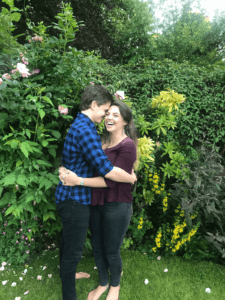
Aid Without Asking: How to Support Someone with ME
The love of my life battles ME/CFS. It’s a disease that my father has also struggled with since I was a boy, so it’s one I know well. I knew life wasn’t going to be simple when we met, but I dove in head-first anyway. I can’t say it’s been easy, but I can definitely
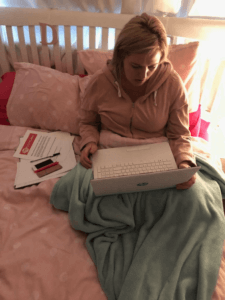
Volunteers: the bedrock of every #MEAction Scotland campaign
Volunteers are at the heart of everything #MEAction Scotland does. We are always looking for more people to help make a difference and support our work in Scotland. Currently, #MEAction Scotland is run by a small group of volunteers, most of whom have ME, with support from the UK coordinator. If you are interested in
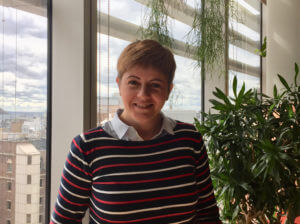
Meet the #MEAction Staff: Espe Moreno
I am delighted to be part of the series in which you are getting to know the #MEAction staff! My name is Espe and I am #MEAction’s UK Coordinator. I am so honoured to be a part of the staff at #MEAction. I came to #MEAction via Unrest, as I was working on the impact
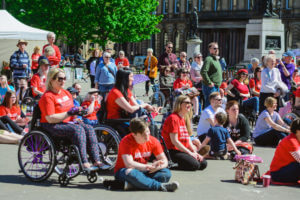
Hundreds gather for #MillionsMissing Glasgow
#MillionsMissing Glasgow on 12 May, 2019, was a huge success, and took place in glorious sunshine which is fairly unusual for this Scottish city! A crowd of around 400, many of whom had travelled from across Scotland, heard people with myalgic encephalomyelitis (ME) speak about their experience of the illness. There was music from local

Enrolling: EDS Genetics Study
What: The Ehlers-Danlos Syndrome (EDS) Society is recruiting individuals to participate in a genetic evaluation study. ME/CFS and EDS have a range of similarities and overlap. EDS is a connective tissue disorder in which musculoskeletal pain, joint pain/hypermobility, and fragile skin are considered common manifestations. Who: 1000 individuals with Hypermobile EDS as well as their family

We are building a movement at #MEAction UK. Join us!
#MillionsMissing – organised by #MEAction – has been such a successful campaign this year, and we thank everyone in the ME community for your part in this. At #MEAction UK we are building a movement. We’ve grown #MillionsMissing, a campaign for health equality for ME, from a single protest in London in May 2016 to
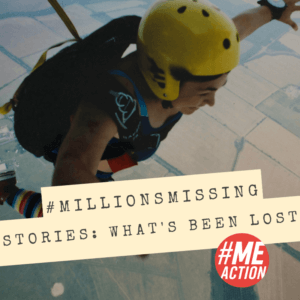
#MillionsMissing from ME: Your Stories
Myalgic encephalomyelitis (ME) is a debilitating, chronic disease that steals so much from the person. We received heart felt stories from around the globe chronicling journeys with ME. This week we touched on parenting, aging, marginalization, and careers. Today we want to share more of your stories. While not all of these stories fit into

Career and Loss for People with ME
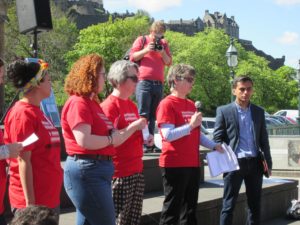
Q&A with #MillionsMissing UK Organisers
On Thursday 18th April, #MEAction UK held a conference call with organisers of #MillionsMissing event past and present from across the UK. There are already events planned for 2019 in all 12 UK regions, with over 25 events in the UK Claire from Southampton, Janet from Edinburgh, Carolyn from Sheffield and Denise from London were

CBT and GET survey results published by Forward-ME Group
In January 2019, a survey investigating the impact of graded exercise therapy (GET) and cognitive behavioural therapy (CBT) for people with ME, CFS or PVFS diagnoses in the UK was made available online. It was intended to provide up-to-date data on the impact these therapies have had on people who have been offered or received
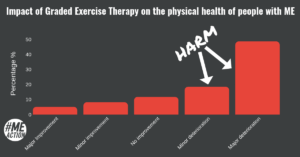
GET and CBT are not safe for ME – summary of survey results
Listen to the recording: #MEAction UK Lay Summary of the 2019 Forward ME Group CBT & GET Survey Topline findings A new patient survey of 2274 respondents has confirmed that graded exercise therapy (GET) is harming a large majority of people with ME receiving this treatment in the UK. A majority of people with ME

A response to Dr. Mark Porter’s article about ME in The Times
Last week, Dr. Mark Porter wrote an article in The Times under the headline, “Treatment for chronic fatigue syndrome is a complicated matter.” The following comments are intended as constructive criticism of that article, with the hope that they will help to further understanding of the issues he raised. Although I have focussed on my

